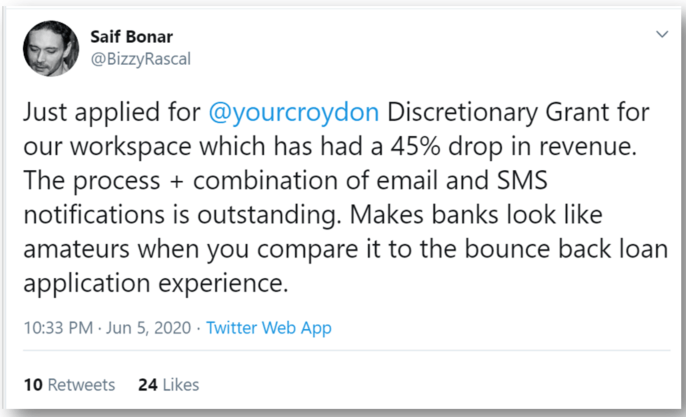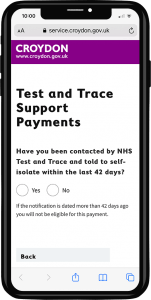Croydon Council’s low code platform: delivering more for less
The technology has enabled the council’s digital department, CDS, to support the council’s pandemic efforts alongside building better online services for residents.

Last April, Croydon Digital Service (CDS) wrote about our first forays into ‘low-code’ with our new platform, Netcall’s Liberty Create. I’m delighted to say that at this point we have completed 9 live and supported services, including a major new project management tool for the council, and have more ambitious products in delivery.
The council would otherwise have had to buy these products off the shelf and either pay an external company to maintain and update them, with limited say over improvements, or build them more slowly and at greater expense using software developers.
Instead we’ve been able to build more rapidly in-house, with control over the budget and freedom to build what our users need.
Here are a few highlights.
COVID-19 support
Our first apps were built in response to the pandemic, to track the needs of shielding residents and give out support grants. Low-code was particularly helpful as it allows us to build end-to-end quickly: from the public site to back office processes – crucial as our residents were applying for support and council staff needed to be able to process the applications quickly and efficiently.
Business grants
Over the course of the pandemic there has been a range of different business grants that Croydon businesses could apply for, to help them during lockdowns. When the first few came out, we built individual applications and back office processes in low-code.
As demand grew, our platform development lead Kevin Rowe realised that we could use low-code to develop a platform specifically for business grants. This had all the core functionality set up – application form, processing criteria, grant amounts, email and SMS templates, BACS export files and reporting – and could be reused again and again for each new grant that was rolled out.
By the time it came to paying out top-up grants in later lockdowns, the platform enabled us to import the information required to pay businesses again, streamlining the development process.
We had some amazing feedback from businesses:

A happy customer
Shielding database
The government and the NHS worked together to identify people who were clinically extremely vulnerable to Covid-19, and contacted them encouraging them to register on GOV.UK if they needed support while “shielding” (this meant they were advised to stay at home).
This information was shared with local authorities and we stored the Croydon data in a secure shielding database, which we built in low-code.
The database helped the council to prioritise contacting those who had asked for help, and to manage demand over multiple lockdowns.
Contact centre staff logged the calls on the database and we were then able to download reports from the platform, showing what the outcomes of those calls were. This made sure the council reached as many people as possible who needed help with getting medicine, food and other essentials.
Test and Trace Support Payments
Residents who were contacted by Test and Trace and told to self-isolate, or who could not go to work because their child was self-isolating, could claim a one-off £500 payment providing they met certain eligibility criteria.
For this we built an end-to-end service that covered applications, submitting evidence, back end processing and authorisation.

Residents who were asked to self-isolate could apply for a £500 grant if eligible
As the year went on, different requirements came in, such as the ability to submit an application if your income had fallen below a certain threshold, regardless of whether you met other critieria.
We had to ensure this process in particular was mobile optimised as residents were more likely to have a smartphone than a laptop.
LBC delivery tracker
It hasn’t all been Covid-related, thank goodness.
The new LBC delivery tracker – one source of truth for projects in delivery – started as a Utopian pipe dream for our head of digital operations, Dave Briggs. It is now a reality.
Gone are multiple spreadsheets to wrestle with, instead we now have an effective project tracker tool that is a go-to for managers. We’re using it across Croydon Digital Service, and it has been rolled out to other teams across the council to track projects related to the Croydon renewal improvement plan.
Like any new product, it is being continuously iterated, the most recent feature being the addition of timesheets so we can track how time is spent across our projects.
While the tracker does generate some of its own reports, we’ve also integrated it with PowerBI via an API so that richer reports can be created from the data. This is something we hope to extend across all our future low-code apps.
And more
There’s so much more in the low-code pipeline, including:
- a faster look-up for bin collection days and the ability to download your bin collection calendar
- improved call logging system for our contact centre and out-of-hours staff
- removing the need for residents to log in for certain services, such as reporting a missed bin collection, garden waste subscriptions, making a dropped kerb application and more.
We’re removing friction for residents by making those activities a more seamless part of the Croydon Council website journey, and redesigning them to meet residents’ expectations of what a good online service should look like.

The first screen of the new bin collection day look-up prototype
Cast and crew
We now have 10 low-code developers – most of whom are working part-time on the programme while managing other workloads.
While some were already developers by profession, others came from different disciplines, including application support and content design. They were trained in low-code over 3 days, after which they could start building apps.
They’re part of a multi-disciplinary team along with a product manager, delivery manager and platform technical lead. Ad hoc support comes from other disciplines including interaction design, content design, user research and technical architects.
We’re encouraged by what we’ve been able to deliver and iterate on at pace, and really excited by what’s to come.
If you are interested in finding out more, please email product manager Victoria Hunt: victoria.hunt@croydon.gov.uk or comment below.

